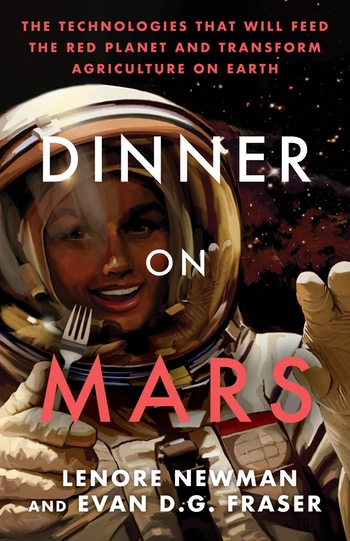Review: Dinner on Marsby Jeff Foust
|
| “If we (as a society) end up spending billions of dollars to send a handful of folks off-planet, then we really need to ensure that in doing so we also make life better for folks here on Earth.” |
There are two sets of challenges the authors address in preparing dinners, or other meals, on Mars. The first set involves producing food itself, given the hostile environment on Mars: almost no atmosphere, weaker sunlight, a sterile regolith, and more. The second is more cultural: people will crave variety and certain types of foods, seeking not just sustenance but also something they can enjoy. It might be possible, for example, to produce an algae-based food that meets all nutritional requirements, but even the hardiest Mars settler will tire of eating algae stew day in and day out.
Newman and Fraser are cautiously optimistic that both challenges can be overcome. They examine innovations in agriculture, biotechnology, and nanotechnology that could enable plants to grow in confined, austere conditions, allowing future Mars settlers to enjoy a wide variety of fruits and vegetables. Grains will be more difficult to grow, although they foresee at least some oats in order to provide alternative daily products. That will be necessary because they don’t think it will be feasible to transport farm animals to Mars, but there could still be chicken and fish in the form of cultured cells, 3D-printed into fillets.
Their interest in these new food production techniques goes beyond simply enabling dinners on Mars. The same approaches and technologies could also be used on Earth to address the problems of modern agriculture, from overuse of fertilizers and the resulting pollution to greenhouse gas emissions, particularly from raising animals. “Feeding Mars is a chance to build a food system from first principles divorced from the mistakes of history,” they wrote.
Those terrestrial spinoffs may also be an essential justification for sending humans to Mars: “if we (as a society) end up spending billions of dollars to send a handful of folks off-planet, then we really need to ensure that in doing so we also make life better for folks here on Earth.” They acknowledge, though, that not everyone sees it that way. As one researcher they interviewed put it, “But you do realize that it will be much easier and cheaper just to save Earth than go to Mars to figure these things out only to return to Earth?”
Newman and Fraser discuss issues like that throughout the book: many passages are structured as recollections of conversations the two had over Zoom over the course of the book (which started as a project early in the pandemic.) They believe that it’s possible for the technologies they describe to allow humans on Mars to have balanced yet enjoyable diets, but that “it is on Earth where this food revolution will have the biggest impact.” After all, even if Musk realized his vision of a million Martians, there will still be ten billion more people on Earth. Fortunately, those on Mars will be able to look forward to dinner.
Note: we are using a new commenting system, which may require you to create a new account.
